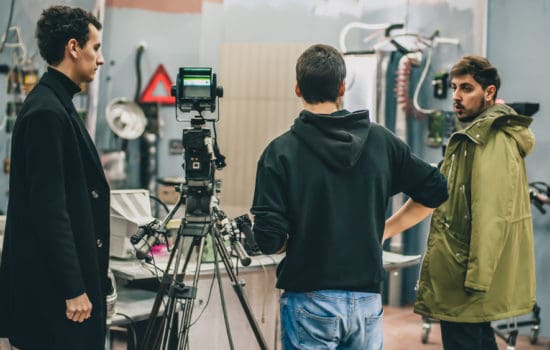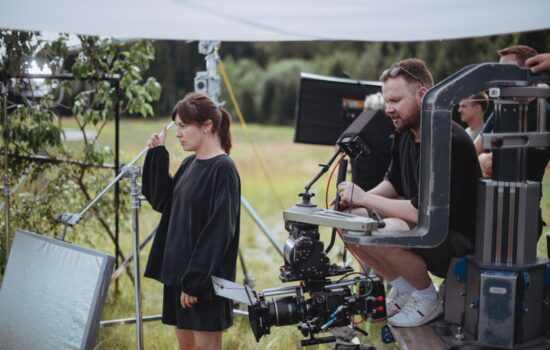TV Producer

How To Become a TV Producer
People also ask
Career Description
The role of a Television Producer on production is extremely wide-ranging. A Television Producer may assume an executive and development role, conceiving the story and aiding Writers on an above the line level, or they may be doing nitty-gritty production work such as budget-making and line producing, or depending on the type of production, they may be doing it all. They may be referred to as a Producer, Executive Producer or Associate Producer, depending on their specific role.
Angela Gulner was actually a working Actress in Hollywood when she made the switch to television production. The change came out of a desire to give her own career more control and possibility. Her first foray was with her hugely successful independent pilot, Binge, which is now being developed into a larger series.
Gulner says the reality of producing Binge was an incredible amount of hard work: “I was line producing as well as executive producing.” Gulner also created the show, wrote the show, and starred in it. Not to mention the show was based on her personal story.
“It was spreadsheets and communications and putting out fires,” she states. “We were very understaffed so everyone wore a ton of hats, which is both good and bad because everyone was looking out for things, but also no one had completely assigned duties so there was a lot of room for miscommunication.”
The initial pilot was also crowdfunded, so Gulner and her producing partner Yuri Baranovsky also produced a crowdfunding campaign — a whole other beast. “We had to be aggressive with scheduling. I had to kind of assume the central hub for that campaign, and we had to have a set release schedule, and social media schedule, and all kinds of schedules, really.”
Gulner also spearheaded pre-production of the Binge shoot. “It was a lot of gathering resources, making phone calls, making schedules, and juggling numbers to see what we could afford. Also once you get on set it was kind of like, you have a plan of how you think it’s gonna go, and it never goes that way.
“It was a lot of adjusting in the moment to figure out how you deal with hiccups along the way. It’s definitely a balancing act.”
As the show evolves, Gulner has taken on a more executive role: “The process now has been pitching it to move into a larger capacity. That has involved teaming with a studio and a Showrunner with more experience that can help mold it into a more traditional television structure.
“It has meant re-working the way the plot moves forward and slowing down the plot so we don’t burn through too much too fast. Our original idea for Season 1 has become more of Season 2. Overall it has been a fascinating learning experience so far.”
What does a TV Producer do?
The responsibilities of a TV Producer can vary according to the needs of the project. In some cases, a TV Producer focuses mainly on the financial components of a show, such as the overall budget and cast and crew contracts. Some TV Producers may attend to the logistical needs of the show, such as securing locations and generally making sure the production is progressing according to budget and schedule. Still others may work in-house at a production company or studio and concentrate on generating show concepts.
Salary
The average annual salary for a TV Producer is approximately $76,700. The salary range for TV Producers runs from $35,000 to $115,000.
Gulner cautions when you first start out sometimes your earnings come in the form of credits. “You absolutely have to build your resume before the money comes,” she says. “Producing is no different… that’s why you either gotta keep the side hustle, or be willing to do a variety of jobs in the business to help make ends meet while you work your way up.”
How much are TV Producers paid?
On average, a TV Producer’s annual salary is approximately $66,000. That being said, individuals who work on network shows tend to have higher salaries than those who work on streaming or cable series.
Hey, what do you think about trying our new Film Career HelperFilm Career Helper really quick? It’s totally free and could help get your career moving fast! Give it a try. It’s totally free and you have nothing to lose.
Career Outlook
“There is no denying the business is a hustle,” says Gulner. “It takes a while for it to get glamorous. You will have to juggle many jobs for awhile. Definitely strive to find a work/life balance. You also really have to be flexible, which is not always the easiest.”
How does a TV producer handle unexpected issues or changes during production?
Let’s be honest. There is no such thing as an entirely uneventful film set. Stuff always happens and goes wrong. Sometimes that’s on a very small scale, others it’s a lot larger. A TV producer needs to effectively navigate whatever challenges may arise and handle them appropriately. Here are a few tips on how to accomplish this…
-
- Stay Calm
No matter the situation, it’s imperative that the producer remain calm throughout it. Keeping an even-keel will not only help maintain thought clarity, it’ll also signal to the rest of the cast, crew, and whoever else in proximity that things can – and will – be taken care of correctly.
-
- Communicate
Gather the appropriate departments and/or people involved in the situation, share your assessment and then, collectively, work up a feasible plan of action. Alert relevant stakeholders and keep them apprised of the situation as you work through it.
-
- Make Decisions
Once the team has had a moment to regroup and weigh options, it’s essential to put a sensible, feasible plan into action. Decisions should be based on the best interests of the production, taking into account financial, creative, and logistical impacts.
-
- Delegate Tasks
Actions should be dealt out according to priority. Appropriate team members should be handed tasks they can competently accomplish.
-
- Record The Event
Producers need to keep a document of any changes made to the overall production plan. This includes updated budgets, schedules, or script changes. This documentation will serve as a reference of the incident/occurrence and could potentially play a vital role in the project’s future.
Career Path
Gulner feels she has come a long way since she first moved to LA: “Trying to climb the acting ladder in the traditional route was frustrating. Every time I got a leg up I would fall back down, and I felt stuck. I got tired of depending on other people. Moving into writing and producing allowed me to take back the power — I didn’t feel like a victim of the industry.
“I felt like I could put my own stamp on things. This feels better than the straight acting journey because I am offering more of myself. I am offering more skillsets and I feel more fully engaged. I think it’s a really smart move for Actors who feel frustrated and voiceless.”
Gulner also stresses building a team is incredibly important: “Find filmmakers who are good at things you are not good at, and find projects you are really passionate about that you are willing to put in long hours because work begets work. The more you practice, the better you get.
“Try to surround yourself with people who know better than you. And don’t be afraid to experiment with form. You could produce a podcast, a stage play — there are other ways to take your creative nugget when your funds are low and make a proof-of-concept to get people excited about the idea.”
“You will find that when you decide to double down on your passion projects, you will also have to keep your side hustles. Sometimes there are choices to be made between money and passion. With a more traditional producing path than mine you can always work your way up at a desk at a studio, as an Assistant, on set; there are many ways to make strides in this career path. There’s definitely no right or wrong way.”
- “When you are first getting started, try to get a PA job, or an Assistant job.
- Get as close to the action as possible. Buy someone coffee, and above all else, don’t be afraid to ask questions.”
How does a TV producer get started in the television industry?
Getting started as a TV producer requires a number of factors. From familiarizing yourself with the industry to making contacts in the business, here are a few techniques on how best to break into the world of TV producing…
-
- Get an Education
Although not a requirement of the industry, getting a formal education in the ins and outs of the business couldn’t hurt. Degrees in communication and film and television production are available at a vast majority of institutions and can prove to be invaluable tools when it comes to learning how the business works.
-
- Internships
These usually don’t pay well (or at all, in many cases), but getting first-hand experience of the working life of a TV producer can be an invaluable education in the field. Immersed in a fully operational production environment, internships allow aspiring producers to see, hear, and learn things they never would in a classroom.
-
- Build a Resume and Portfolio
Get active and produce as much work as you can, whether that’s your own or even a student production. The more experience you gain, the more you can populate your resume and have a portfolio of completed work to show potential hiring managers.
-
- Network
There may be no more crucial step than this one when it comes to finding work in the film and TV industry (or most industries, for that matter). Attend as many conferences, networking events, and industry functions as you can. Try and talk to as many people as you can. The bigger your own personal network becomes, the greater the likelihood of you getting hired.
Experience & Skills
“Being scrappy and being able to problem-solve on your feet and think of creative solutions and being open to being bad at something for a while — actually, just saying ‘yes,’ that can get you pretty far,” says Gulner.
Gulner also says to not worry about getting your hands dirty: “Learn how cameras work, do any job on set, and truly find what you are interested in. Curiosity and staying power are the most important. It takes a long time to see progress, and you have to find the joy in the process, otherwise, you’ll go crazy, so you have to keep making stuff.”
Gulner stresses as a Producer you are the one managing many, many personality types. “Ultimately you have to be a good communicator,” she says. “Also, check your ego and be kind. An important note for myself is to not be afraid to be assertive. I feel as women we also really want to please, but when you need to be assertive, don’t be afraid to take a stand.”
What is a TV Producer called?
TV Producer is often a secondary title given to individuals such as the Showrunner or even Head Writer on a show. A TV Producer can have this singular title, but it is often given in addition to their other primary responsibilities on a series.
What specific skills are crucial in order to be a TV producer?
TV producers wear many different hats during the course of a production. Their job entails creativity, organization, and leadership. Here are a few specific skills needed to get the job done right…
-
- Communication
This seems like a simple skill, yet some people are more adept at this than others. Producers can often be the go-between for so many departments and they need to be able to effectively communicate with everyone. Communication allows strong collaboration, aligns teams and departments, and prevents misunderstandings.
-
- Leadership
A strong producer acts as a guide for the entire production. They need to keep the production running smoothly and on-track, as this can entail shepherding work and resolving conflicts.
-
- Oversight
TV producers need to organize, plan, and execute the mechanics of a production to ensure work gets done effectively and on time. They need to keep oversight on budgets, schedules, and creative objectives.
-
- Time Management
This is a crucial skill for a producer, as they need to be able to efficiently allocate time and resources while keeping to production deadlines. Money can easily be lost on a production that doesn’t adhere to its predetermined schedule.
-
- Problem Solving
Problems constantly arise on TV productions. More often than not, it falls on the producer to be the one who fixes things. They need to be able to identify challenges and then come up with practical (hopefully cost and time effective) solutions.
Education & Training
Gulner feels perhaps nothing at this point is a substitute for experience: “I have my MFA in Acting which didn’t teach me much in terms of producing. I also have my BA in Theater and that did require me to do a lot of classes that were not just acting. I learned light design and directing, and all kinds of things that actually gave me a well-rounded education to help me as a Producer.”
“What I would most recommend is to find people you love working with. Find a person with a great camera, find a great Editor, make a little troupe and you can all work together. Doing it is the best way to learn. If you do have the funds to go to a film school, go to a school with great equipment, and go somewhere that forces you to actually shoot.”
Gulner also suggests studying people you admire: “Where are people working on projects you love — what school did they go to? What kind of internships did they do before they got successful? Also, try to turn to a business mindset as soon as you can. And don’t poo-poo being an Assistant.
“If I knew this was where I was headed in my future, I absolutely would have been an Assistant. It can really help get you into rooms in the future. It was a learning curve for me, but the more I can interact with people who have been doing this a long time, the more I feel I belong in this world.”
Additional Resources
“I’m in SAG, and I would like to join the WGA, and then possibly the PGA. All the unions are there to protect you, and maybe now more than ever as the industry is in a major state of change due to streaming.
“Everyone is still struggling to catch up with streaming, and a lot of corners are being cut, and often artists are taking cuts on new media projects that they shouldn’t be taking. There will ultimately be continued growth and change and conflict with that. It’s great to be protected, and have your work be protected, but unions are ultimately growing and changing as well. It’s not a perfect process by any means.”
FAQ
What is the single biggest suggestion you would give to someone wanting to get into this career?
“Just start doing it! Make something! Reach out to everyone you know.”
What’s the #1 mistake people make when trying to get into this career?
“Thinking it will happen for you overnight. The ins and outs can be boring and exhausting, and you can’t let that be a discouragement.”
What is the question people should ask about this career but rarely do?
“How do you afford rent? Also, don’t be afraid to ask questions you want to ask of someone you admire.”
If you could describe in one word what makes you successful, what would it be?
“Perseverance.”
Sources

Angela Gulner
Angela Gulner is an Actress, Writer, and Producer known for GLOW (2017), Binge (2016) and Single Parents (2018). She is also a graduate of the Harvard University/American Repertory Theater graduate acting program.
Gulner’s work in Binge has been featured in Bustle, Indiewire, Recovery Today, and Literally Cooking.
References
- 1Multiple. "TV Producer Salaries in United States". Glassdoor. published: Nov 29, 2018. retrieved on: Dec 14,2019



















